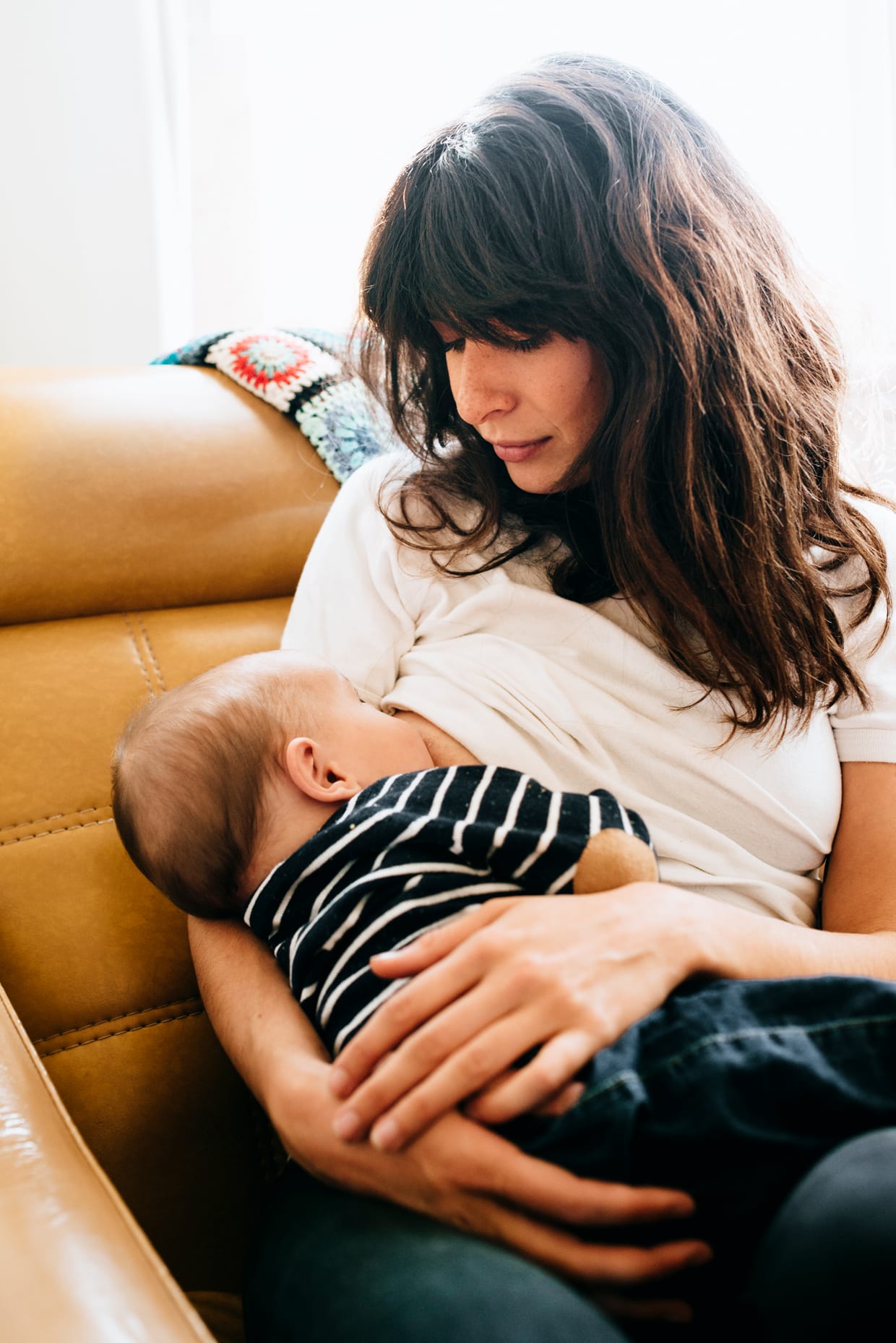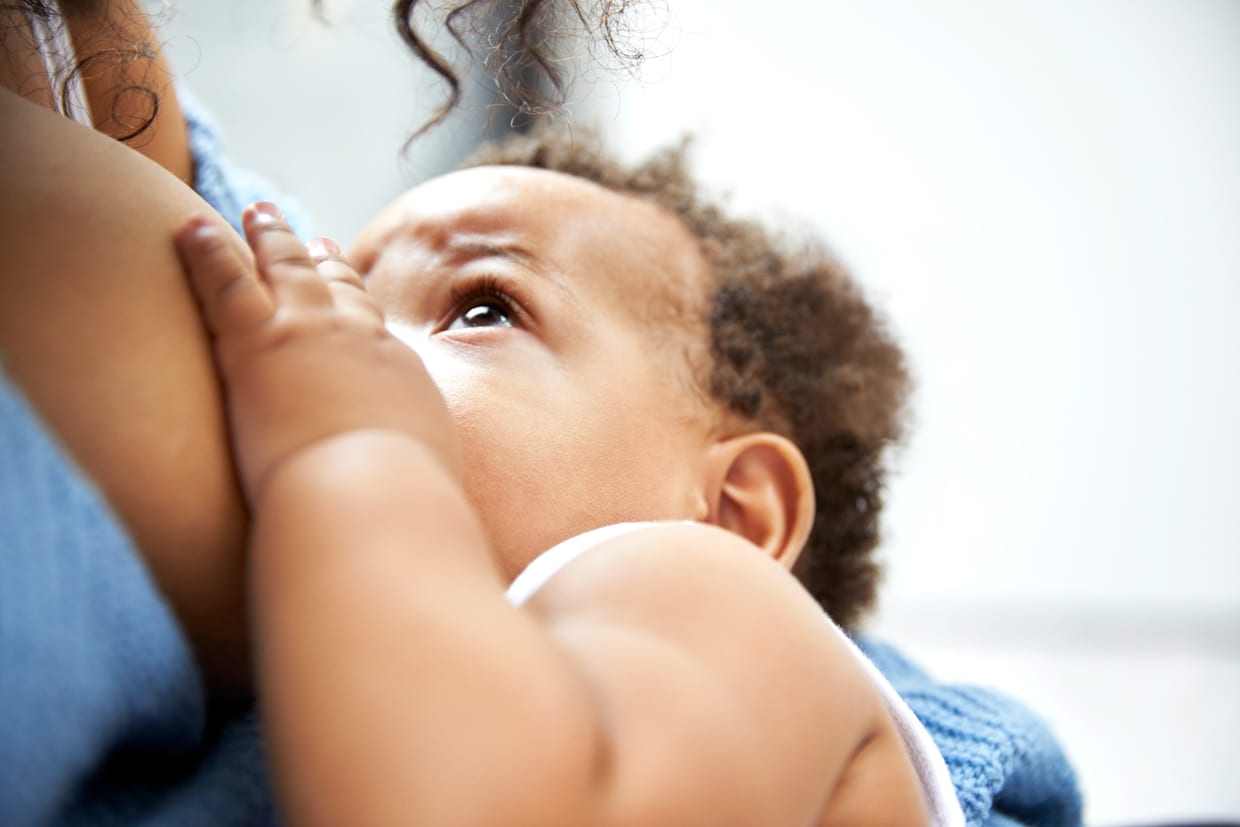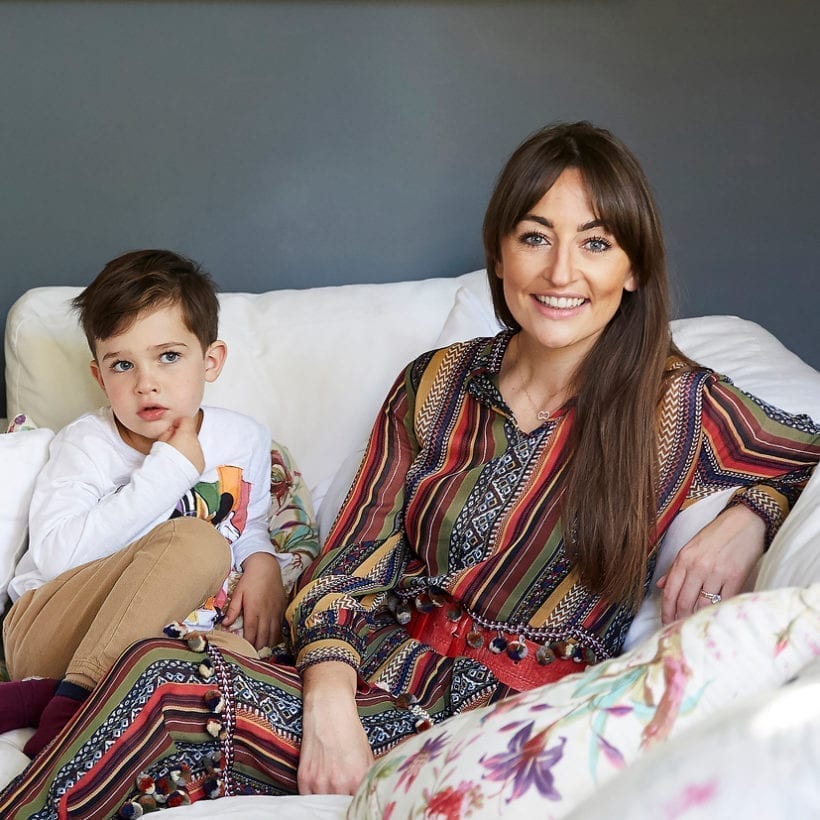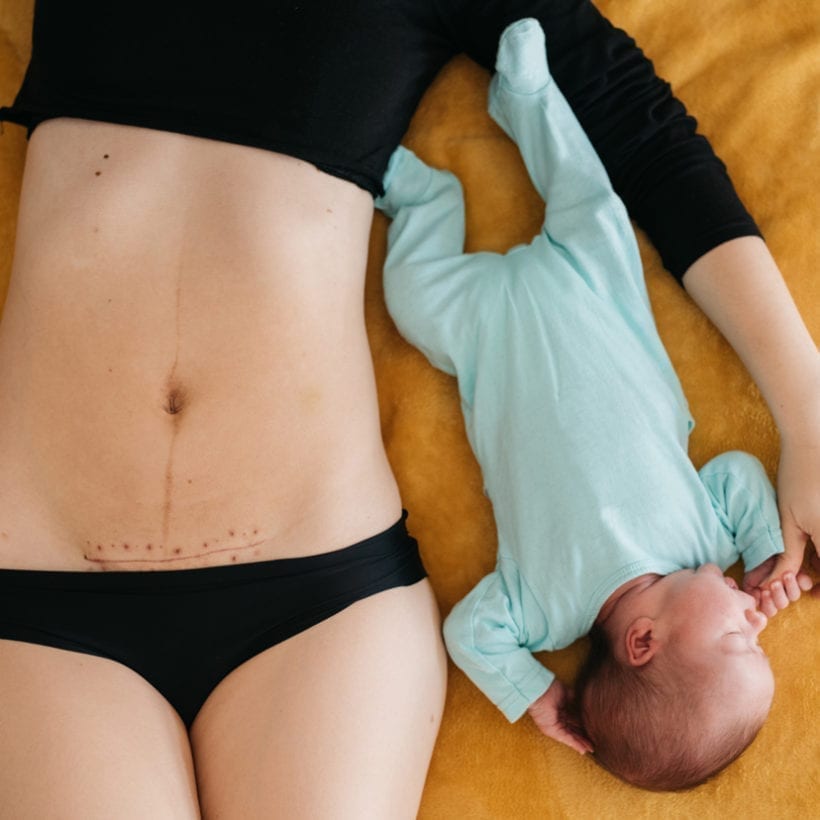There are few things in life I have felt incredibly unprepared for, due in large part to my type A-ness and tendency to over-prepare and over-research. But I could not have been more wrong about one thing: breastfeeding.
Despite breastfeeding becoming a far less taboo topic thanks to social media and new laws in support of nursing moms, I had delusions of grandeur. I pretty much thought I would give birth, blissfully pop my kid on my boob and we would be good to go for at least a year.
Everything was going well, and then our second night came. She did not stop crying. The nurses told me we were experiencing “cluster feeding,” aka the baby wanted to eat all the time. So, I kept on doing what we were doing.
I did not know that “typically,” a newborn eats about every 2 hours — and that her latching to me on again off again in 20-30 minute increments, consistently throughout the night, was abnormal.
I did not know she was not supposed to be crying that much, and that instead she was “supposed” to be a sleepy cozy newborn.
I listened to the nurses and I nursed, nursed, nursed.
I pretty much thought I would give birth, blissfully pop my kid on my boob and we would be good to go for at least a year.
The third day and night were the same, and we were sent home. She had lost weight but within a reasonable amount for a typical newborn. She was borderline jaundice, but we were told to follow up with a pediatrician in a day. So we did. But before that appointment, I made a panicked call to a local lactation consultant because I felt something was wrong.
The consultant weighed my daughter before and after a feed and there was no change. My daughter was, pretty much, not transferring much milk into her tiny body at all. (Why the nurses didn’t notice this, offer formula, or help me in any way understand what was going on is beyond me. I still feel incredible guilt over this.)
Immediately, the lactation consultant opened up a package of a formula sample I had saved (naively thinking, “I will never need this, but I will save it I guess”) and said, “feed her.” And my daughter ate. Fast. And then she slept. She was a totally different baby in a matter of minutes.
I was floored. I felt like a failure. And thanked God I called the lactation consultant that night before, at 10 p.m., in a panic.
It turned out my daughter and myself both were not a perfect match for breastfeeding. Her latch was shallow, due to an alleged tongue-tie, meaning her frenulum (the string-like membrane that attaches her tongue to her mouth) was allegedly too tight. They said hers was “posterior” though, so not visible when she was checked in the hospital.
So, we rushed and saw a local, highly regarded specialist (a pediatric dentist) who wanted to fix it but was not sure it was necessary, another (a pediatric ENT at Columbia Children’s Hospital) who said there was nothing wrong at all, and her pediatrician said the same and to “keep trying.” So, we opted not to proceed with a surgical “snip” because I could not bear thinking of putting her through pain for something that may or may not be the cause of our problem.
Being an overwhelmed, brand new parent, bouncing around to specialists trying to find answers and make the right decision was stressful and difficult.
Another issue? My supply. My milk did not come in right away and then I was not making enough milk. I never did. And I tried everything. Power pumping, lactation brownies and teas, meditation, vitamins — I mean everything. Nothing helped.
A few weeks later we found out our daughter also had reflux, which resulted in spitting up much of what she got from me, difficulty getting comfortable for a feed, and lots of gas and tummy troubles. Baby Zantac was a lifesaver.
My daughter also had a milk protein sensitivity (which compounded the tummy troubles and was evidenced by mucus in her poop) so I had to follow a strict dairy-free diet throughout our breastfeeding journey. It was quite difficult to manage such a restrictive diet in the throes of new motherhood.
https://www.instagram.com/p/BhAAKLXhDfv/
To top it all off, her pediatrician, of all people, told me I had “flat nipples,” which was partly responsible for our troubles. Who knew?
In the end, I made nursing work for me in the best way I could. Nipple shields, pumping a ton, and — supplementing with formula. I lasted seven months, and my daughter is now a happy, healthy 14-month-old.
I learned a lot along the way and feel compelled to share in the hopes my words reach even one new mama completely overwhelmed with breastfeeding.
Here are my top takeaways:
Breastfeeding Takes a Physical Toll
Breastfeeding hurts in the beginning. The pain caused by the bleeding, cracking and peeling I began to feel in the hospital was more than I could have imagined. The nurses were sympathetic and kept offering Lanolin to help, but it was torturous. I would fight back tears and get goosebumps every time my daughter latched the first 2-3 weeks — it was a far cry from this blissful, cozy picture I had in my mind.
I was lucky enough not to get clogs or mastitis, but I know friends who have and they went through hell.
You also have to eat quite a bit to keep up your milk supply and aim to do so healthfully. This was another impossible feat — who has time to cook with a newborn? I did not eat often enough, or the right foods.
Everyone told me you would lose weight nursing since it can burn up to 200-500 calories per day. I did not — probably because it has to do with the number of ounces you produce, and I was “deficient.” I dropped 20 remaining pounds of baby weight only after I stopped.
Also, I should probably state for the record that post-breastfeeding boobs are real. It is a tribe I am happy and proud to belong to but I will undoubtedly be wearing push up bras for the rest of my life.
I tried breast-feeding for weeks and weeks! For me it was so painful but I also was not producing a lot of milk. So I had to pump every time she was napping. I guess due to stress my milk was not coming in. I tried and I just couldn’t give her enough. So I had to go to formula. https://t.co/3ohDLsa1RU
— Khloé (@khloekardashian) November 19, 2018
It Also Takes a Mental Toll
Nothing can make you feel more inadequate than not being able to feed your baby the way you want and hope for. This hurts. It sounds crazy, but I have always been ambitious and hard-working and rarely failed at accomplishing what I set out to do but this, to me, was one giant failure. It made me depressed and anxious, and when you pair that with preexisting anxiety and crazy postpartum hormones, it was not pretty.
Having a newborn is hard enough, exhausting enough, physically taxing enough, but when you pair it with nursing, then pumping every two-three hours around the clock for months at a time, sterilizing and cleaning the breast pump parts (and there are so many parts), and trying to remember to shower (at least every other day) it is a whole different beast. There was no “let’s take shifts.” I was always on. So was my husband — and he was so incredibly supportive. We were in it together, but it was so damn hard.
Oh and the real kicker? Stress can minimize milk production. So can a poor diet, and not enough rest. Funny, right?
It Does Not Come Naturally To Some Women (Or Babies)
Some women have flat nipples. Some babies have tongue-ties. Some babies are preemies that can’t nurse right away. Sometimes a mother’s milk comes in many days after giving birth. Sometimes it works beautifully right from birth, and sometimes it takes a ton of work. Sometimes, it does not work at all.
https://www.instagram.com/p/BYMQsPIBdwN/
It is Not Always What is Best For Your Family
While many like to remind you that “breast is best,” it is impossible for a new mom to not feel guilt or pressure in hearing that. Actually, fed is best.
I felt an incredible amount of guilt when I had to supplement with formula which in hindsight is ridiculous. I looked wistfully at moms who were happily nursing on park benches, in restaurants, anywhere and everywhere they needed to while I was often tethered to my pump or shaking up a bottle of formula.
My daughter needed it, and not because I failed somehow. She just needed to eat. So she ate. End of story. Next time, I will make sure my child is fed, happy and healthy. I will refuse to feel guilty about how we accomplish that.
My Biggest Lesson
My breastfeeding journey was long, arduous, painful, difficult and beautiful. I learned a lot along the way but, most importantly, I learned that a happy healthy mom is necessary to have a happy, healthy baby.
Next Time
I vow that should we be blessed with another baby, I will try my best but also know when it is time to stop trying. I will know that it is more important to be rested, healthy and coherent than to be exhausted, stressed, emotional, in pain and “succeed” in nursing.
It is more than OK to stop if it is not working or is creating added, undue stress. I will remember this next time, instead of forcing something that maybe was not meant to be.
 If my next baby has a sensitivity or dietary restriction that results in me having to make major dietary changes again, I probably will take that as a sign to stop. Making another change in my life (that was already completely flipped upside down) was overwhelming, time-consuming, and stressful. Of course, I would do anything for my child. But this added stress and worry may not have been worth it in the end.
If my next baby has a sensitivity or dietary restriction that results in me having to make major dietary changes again, I probably will take that as a sign to stop. Making another change in my life (that was already completely flipped upside down) was overwhelming, time-consuming, and stressful. Of course, I would do anything for my child. But this added stress and worry may not have been worth it in the end.
I won’t desperately spend hundreds, maybe even thousands on the “extras” like the teas, cookies, potions, portable pumps, and other items marketed toward breastfeeding moms.
I will stock up on extra pump supplies and do all the washing at the end of the day, instead of succumbing to an endless and overwhelming cycle of nurse, bottle feed, pump, clean, sanitize, dry, repeat sometimes six times a day.
I will have zero shame in using formula whether it is to get us started in the beginning of our nursing journey, to supplement throughout, or to provide the sole form of nutrition for my baby.
I will use a lactation consultant from the beginning to ensure we are off to a strong and healthy start
And, I will know that my best is enough.
As my doctor liked to put it: “One day all kids, regardless of how they have been fed as babies, will be eating dirt on a playground.”
What would you do differently a second time?
We only recommend products we have independently researched, tested, and loved. If you purchase a product found through our links, Sunday Edit may earn an affiliate commission.







